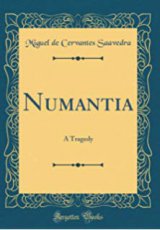The Siege of Numantia Page #4
The Siege of Numantia is a tragedy by Miguel de Cervantes set at the siege of Numantia. The play is divided into four acts. The dialogue is sometimes in tercets and sometimes in redondillas, but for the most part in octaves.
Genre: History
Genre: History
- Year:
- 1582
- 1,078 Views
At all events Cervantes was no dilettante soldier. If he talks of the horrors and glories of war and siege he talks of things he knew and had felt. In his early manhood he was one of those high-spirited youths (Mozos de gran brio), of good birth and breeding, who crowded the ranks of the Spanish army in Italy, to do service to their country and gain honour thereby. He had fought and bled at Lepanto, in the affair at Navarino, at the storming of Tunis and La Goleta. He was simply a private soldier and did his duty bravely as hundreds of his comrades did. Strange to say, it was only during his five years' captivity in Algiers that he was enabled to display his higher military qualities and especially his faculty of command. Amongst the 25,000 Spaniards in that den of horrors he at once took the foremost place. He was the leader in every daring plan of escape, and only failed at last through treachery. He was the originator of that desperate scheme for the seizure of Algiers by the uprising of the Christians, which was nipped in the bud by the faint-heartedness of Philip II., who feared to risk his fleet in such a glorious enterprise. But successful or not he was idolized by his comrades, and feared by his enslavers, who nevertheless would not touch his life, such was the charm his heroic spirit exercised. But his bearing as a man was more heroic still than his daring as a soldier. The written testimony of his comrades, still preserved, tells us how gentle he was in manners, how brave in heart; how generous to his needier brethren even out of his poverty; how tender to the captive children and how mindful of their welfare; how proud of his honour as a Spaniard, and steadfast in his faith as a Christian, while hundreds surrendered both in the sheer agony of despair. Cervantes escaped, as by a miracle, from a life-long slavery in Constantinople; but only to wage a life-long battle with adverse fate, and at length to die with a smile on his lips. In the Dedication we have ventured to link the name of Gordon with that of Cervantes, and in so doing we feel we do no dishonour to the name of either. Though differing in language and creed, and separated by well-nigh three centuries, they are, nevertheless, kindred souls. In both the Quixotic spirit, in its noblest sense, is clearly displayed. Cervantes was the inventor of Quixotism because it lay deep in his nature. This Quixotism, what is it but the sublime of imprudence? To do what the enthusiasm of the soul prompts and compels; to do it with single-hearted unselfishness; without regard to the adequacy or inadequacy of means; without regard even to eventual success or non-success; but with simple regard to the inspired voice of duty within, come what may: that is Quixotism in supreme degree. Of this sublime imprudence Cervantes and Gordon were equally guilty in their day, and both reaped the reward of it, especially from their country's rulers. It was their joint fate during life to be an enigma to most, a wonder to many, and in death or after death to be beloved by all. It is not for us to say more of the noble man whose name is now a household word amongst us. It is to be hoped when his Diaries are brought to light, and the true story of his sufferings and death is known, that one of our gifted poets may do for the Hero of Khartoum what Cervantes has done for the heroes of Numantia, with a higher harp if not with loftier patriotism. Meanwhile we may be permitted to pay, with all humility, this little tribute to his memory.
Translation
Translate and read this book in other languages:
Select another language:
- - Select -
- 简体中文 (Chinese - Simplified)
- 繁體中文 (Chinese - Traditional)
- Español (Spanish)
- Esperanto (Esperanto)
- 日本語 (Japanese)
- Português (Portuguese)
- Deutsch (German)
- العربية (Arabic)
- Français (French)
- Русский (Russian)
- ಕನ್ನಡ (Kannada)
- 한국어 (Korean)
- עברית (Hebrew)
- Gaeilge (Irish)
- Українська (Ukrainian)
- اردو (Urdu)
- Magyar (Hungarian)
- मानक हिन्दी (Hindi)
- Indonesia (Indonesian)
- Italiano (Italian)
- தமிழ் (Tamil)
- Türkçe (Turkish)
- తెలుగు (Telugu)
- ภาษาไทย (Thai)
- Tiếng Việt (Vietnamese)
- Čeština (Czech)
- Polski (Polish)
- Bahasa Indonesia (Indonesian)
- Românește (Romanian)
- Nederlands (Dutch)
- Ελληνικά (Greek)
- Latinum (Latin)
- Svenska (Swedish)
- Dansk (Danish)
- Suomi (Finnish)
- فارسی (Persian)
- ייִדיש (Yiddish)
- հայերեն (Armenian)
- Norsk (Norwegian)
- English (English)
Citation
Use the citation below to add this book to your bibliography:
Style:MLAChicagoAPA
"The Siege of Numantia Books." Literature.com. STANDS4 LLC, 2024. Web. 18 May 2024. <https://www.literature.com/book/the_siege_of_numantia_60>.




Discuss this The Siege of Numantia book with the community:
Report Comment
We're doing our best to make sure our content is useful, accurate and safe.
If by any chance you spot an inappropriate comment while navigating through our website please use this form to let us know, and we'll take care of it shortly.
Attachment
You need to be logged in to favorite.
Log In